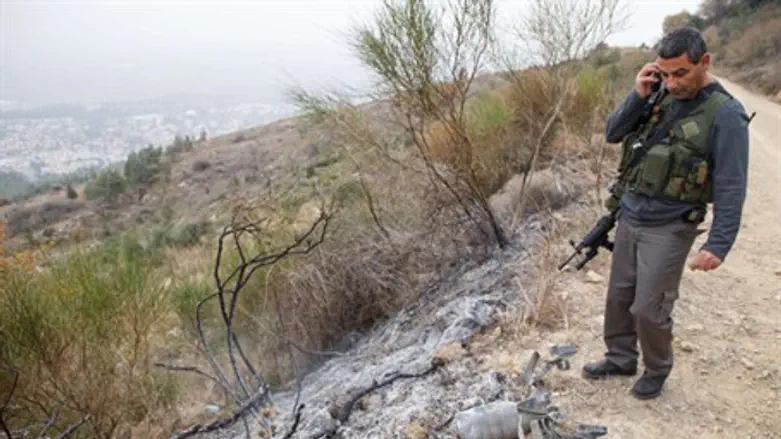
The radical upsurge in rocket attacks from Gaza since Wednesday is meant for political gain, not to start another war, according to Arab professors in Gaza.
Nearly 100 rockets, dozens of them falling short in Gaza, have been fired at Israel since Wednesday in the largest-scale attack since the 2012 Operation Pillar of Defense, with more rockets trickling in on Thursday. In response, the IAF hit 29 Islamic Jihad and Hamas terror targets Wednesday evening.
However, Adnan Abu Amr, a political science professor at Gaza's Ummah University, told AFP "the sides are sending the message that they do not wish to embark on unlimited confrontation," pointing to the fact that the rockets largely hit open land, and the response hit terror camps after they were deserted.
"There is no will for confrontation on Hamas's part, but rather for drawing attention to Gaza," argued the Arab professor, citing Islamic Jihad's announcement that the Egyptian-brokered ceasefire was back in place Thursday at 2 p.m. Israel denied the ceasefire had been reinstated, and indeed two more rockets were fired at Ashkelon Thursday afternoon.
Islamic Jihad was behind the attacks, claiming it fired 130 rockets on Wednesday. However, Naji Sharab, a political science professor at Gaza's Al-Azhar University, said the attack could not have occurred without "consultation and coordination" with Hamas.
Sharab argued the move "helps to break (Hamas's) isolation and pressures Egypt to reopen the Rafah crossing" connecting Sinai and Gaza. Egypt outlawed Hamas last Tuesday, and has besieged Gaza by cutting off illegal smuggling tunnels.
Hamas's consent to the rocket barrage was meant to raise tensions "because of its unprecedented isolation since the dismissal of (former Egyptian President) Mohamed Morsi," claimed Mkhaimer Abu Saada, also of Al-Azhar University. Morsi's Muslim Brotherhood was closely connected with Hamas.
Israel's war of deterrence
Meanwhile, former Israeli National Security Advisor Uzi Dayan said Israel's involvement is limited to a battle of deterrence.
"The Israeli approach is one where we respond with force in order to restore deterrence but not so brutally as to oblige them to retaliate too
violently, with the hope that there will not be victims," announced Dayan.
Israeli sources have said regarding the claims of a ceasefire that "quiet will be answered with quiet."
However, not all are for the light-handed approach. Intelligence and Strategy Minister Yuval Steinitz and Foreign Minister Avigdor Liberman responded to the rocket barrage by calling on Israel to retake Gaza.
“Sooner or later we will have to take control of Gaza, in order to get rid of the Hamas regime,” Steinitz said. “We do not need to reoccupy it permanently, but we do need to remove from Gaza the option of firing rockets on us. If and when the moment comes when we must retake Gaza – and that moment is coming soon – the operation will have to be a very quick one."
Liberman for his part said "following an attack like this - a barrage of more than 50 rockets - there is no alternative to a full reoccupation of the entire Gaza Strip."